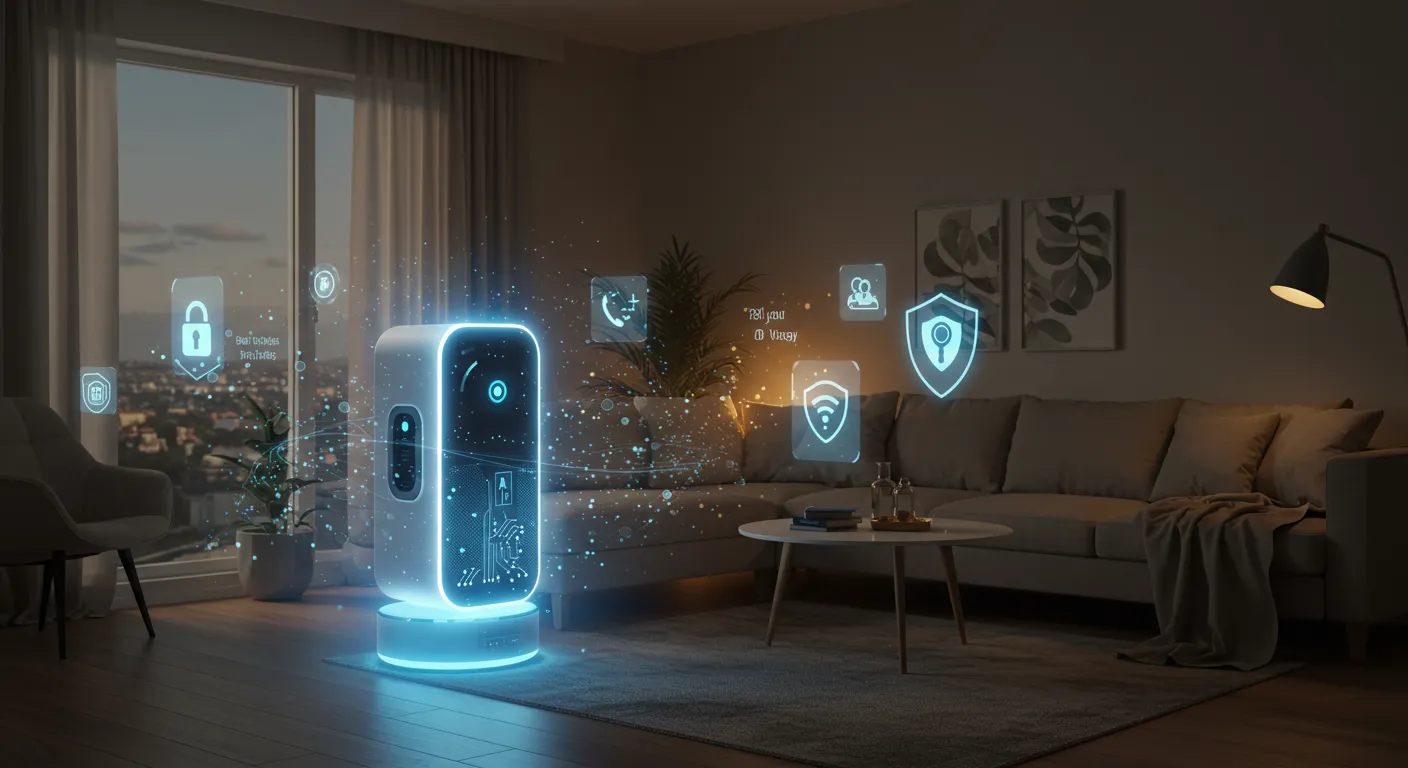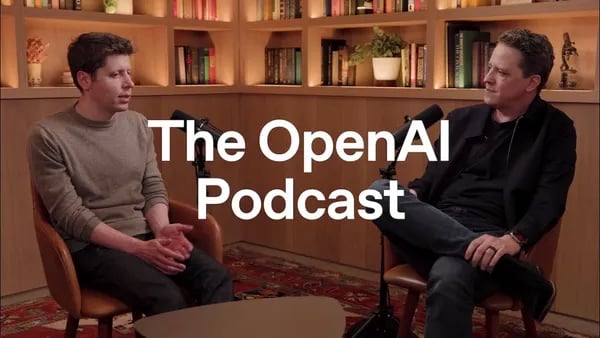I never expected to hear someone compare raising a child with building Artificial Intelligence, but here we are. In the inaugural episode of the OpenAI Podcast, host Andrew Mayne and CEO Sam Altman plunge into the weird, fascinating intersections of AI and real life. If you’ve ever wondered whether ChatGPT can help you survive toddler mayhem, keep reading, I took notes so you didn’t have to watch the whole thing.
From Playpens to Prompts: How AI is Reshaping Parenting and Childhood
When I think about the early days of parenting, I can’t help but reflect on how much technology has changed the experience. As a new parent, I found myself turning to ChatGPT for parenting use almost constantly—especially during those sleep-deprived first weeks with a newborn. It’s not just me, either. Friends and colleagues at OpenAI, many of whom are also starting families, share similar stories. In fact, Sam Altman, CEO of OpenAI, put it plainly:
I don't know how I would have done that [parenting] without ChatGPT.
This isn’t just about convenience. It’s about having a reliable, always-available AI daily companion for everything from baby care basics to those late-night developmental questions that creep in when you’re unsure if something is “normal.” Research shows that AI-powered parenting is quickly becoming normalized, fundamentally changing the developmental environment for today’s children.
Parenting in the Age of AI: Real Stories from the Front Lines
Altman’s experience is far from unique. Many new parents are discovering that AI can be a lifeline, especially when traditional support systems feel out of reach. In the podcast, Altman describes how he relied on ChatGPT for everything from feeding schedules to understanding developmental milestones. As he puts it, “Now I kind of ask it questions about, like, developmental stages more because I can do the basics. But this is normal.”
It’s not just about getting answers, though. It’s about the reassurance that comes from having a knowledgeable resource at your fingertips, day or night. This shift is echoed by other OpenAI employees, who, despite public fears about AI, are optimistic about raising families alongside these advances. In their view, AI isn’t something to be feared, it’s a tool that can make parenting more manageable and informed.
Children Growing Up with AI: A New Normal
There’s a fascinating curiosity, and a hint of caution, about what it means for children to grow up in a world where AI is ever-present. Altman reflects on this, noting that his own kids will never know a world without AI. “My kids will never be smarter than AI,” he says, but he’s quick to add that they’ll grow up vastly more capable than previous generations, able to do things we can’t even imagine.
He shares a memorable anecdote: a video of a toddler swiping at a glossy magazine, expecting it to behave like an iPad. For today’s children, interacting with AI is just as natural. They’ll look back at this era as prehistoric, a time before AI daily companions were woven into the fabric of everyday life.
Voice Mode and the Rise of the ‘Third Parent’
One of the most striking examples of ChatGPT parenting use comes from a parent who, after growing tired of endless conversations about Thomas the Tank Engine, handed the task off to ChatGPT in voice mode. The result? The child happily chatted with the AI for extended periods, fully engaged and content.
Features like voice mode, interactive storytelling, and child-friendly interfaces are transforming AI into a kind of “third parent”, one that can entertain, educate, and support children in ways that feel intuitive to them. But this also raises new questions. As research indicates, there are growing concerns about parasocial relationships between children and AI-generated personalities. How do we ensure these bonds are healthy? What guardrails are needed as AI becomes a fixture in childhood?
AI is now a practical support system for parents, offering advice and reassurance.
Children are growing up with AI as a natural part of their world, shifting developmental norms.
Voice modes and interactive features are making AI a daily companion for both parents and kids.
Society must consider the implications of deepening child-AI relationships and set appropriate boundaries.

Project Stargate, Classroom Takeover, and the Road to AGI: Inside the AI Revolution
When I first heard Sam Altman talk about Project Stargate infrastructure, it sounded like something out of science fiction. But this is OpenAI’s real, ambitious push to supercharge the hardware that powers artificial intelligence. The goal? To make the next leap in AI capability, supporting models like GPT-5 and beyond. Altman has hinted that if the public truly understood what’s possible with this kind of compute, “they would want way, way more.” That’s a bold claim, but it’s rooted in the reality that AI research productivity is now closely tied to the scale and power of the systems running these models.
Project Stargate isn’t just about bigger servers, it’s about building a foundation for the future of Artificial General Intelligence (AGI). The hardware advances OpenAI is chasing are designed to push the limits of what AI can do, from complex reasoning to creative problem-solving. As we look toward the GPT-5 release, expected sometime this summer, it’s clear that each new generation of models demands more robust infrastructure. This isn’t just an arms race for faster chips; it’s about enabling AI to do things we can barely imagine today.
AI in Education: ChatGPT’s Double-Edged Sword
Of course, the impact of AI isn’t limited to research labs or data centers. It’s showing up in classrooms around the world, where AI in education is rapidly evolving. ChatGPT, OpenAI’s most popular product, has been adopted at a staggering rate. I’ve seen firsthand how it can be a powerful teacher’s assistant, helping students understand tough concepts or providing feedback on essays. When used alongside a good teacher and a solid curriculum, research shows that ChatGPT can genuinely boost learning outcomes.
But there’s a flip side. When students rely on ChatGPT as a homework shortcut, it can turn into just another way to “Google” answers without really learning. I remember those early days of the internet—everyone worried kids would stop thinking for themselves. The same concerns are surfacing with AI. Yet, what’s interesting is how quickly schools and students adapt. The culture around education is changing, and so are the ways teachers integrate AI tools. It’s not perfect, but there’s a sense that we’ll figure out how to use these technologies responsibly.
Redefining Intelligence: The Shifting Goalposts of AGI
The conversation about Artificial General Intelligence is getting more complicated as AI systems get smarter. Five years ago, if you asked anyone to define AGI, the answer would have been very different from today. The cognitive capabilities of current models have already surpassed those old benchmarks. Every year, as the technology improves, more people start to believe we’re approaching AGI. But the definition itself keeps moving, what once seemed impossible is now routine.
Sam Altman describes this as a “gradient” of progress. Each new model feels like a breakthrough, but then the goalposts shift. Internally, when OpenAI launched GPT-4, it felt like there was a decade’s worth of innovation to explore. Now, with the upcoming GPT-5 release and the promise of Project Stargate infrastructure, the possibilities are expanding again. Altman points out that true “superintelligence” might arrive when AI can autonomously discover new scientific knowledge or dramatically accelerate human discovery. That’s the milestone he’s watching for, a system that doesn’t just answer questions, but helps us find new cures, invent new technologies, and push the boundaries of what’s possible.
“If people knew what we could do at the compute, they would want way, way more.” — Sam Altman
As OpenAI continues to invest in both hardware and software, the line between narrow AI and general intelligence keeps blurring. The revolution isn’t slowing down—it’s just getting started.
Can AI Be a Trustworthy Daily Companion? Integrating Memory and Navigating Privacy
When I first started using ChatGPT, it felt like a major leap forward in human-AI interaction. The ability to have a conversation with a computer that could remember details from earlier chats was, honestly, a little mind-blowing. With the introduction of AI memory features, ChatGPT doesn’t just respond to questions, it remembers the quirks, preferences, and even the odd stories I’ve shared. Sometimes, it surprises me by recalling something I’d mentioned weeks ago, making the whole experience feel more personal and tailored. This evolution in AI memory features is making our interactions richer and more intuitive, but it’s also raising new questions about privacy and trust.
Not everyone is comfortable with an AI that knows so much. There’s a certain unease that comes with realizing your digital assistant could know the story of your life, sometimes even better than you do. For many, the ability to turn off memory features is essential, but for others, it’s the very thing that makes ChatGPT so useful. I’ve heard from people who love the convenience, and from others who find it unsettling. This split highlights one of the biggest human-AI interaction challenges: balancing convenience with control.
The privacy debate is heating up, especially as AI becomes more integrated into our daily routines. The recent legal battle between The New York Times and OpenAI over chat data retention is a perfect example. The NYT requested that OpenAI preserve user records beyond the standard thirty-day window, a move OpenAI strongly opposes. As Sam Altman, CEO of OpenAI, put it,
“Privacy needs to be a core principle of using AI.”
It’s a sentiment I share. The idea that a third party could demand access to my private conversations with an AI is unsettling, to say the least.
This legal standoff isn’t just about one company versus another, it’s about how society will define privacy in an era where AI can become our most sensitive confidant. People are already having deeply personal conversations with ChatGPT, seeking advice, sharing secrets, and even using it for parenting tips and emotional support. Research shows that as AI memory features become more sophisticated, the need for robust privacy protections grows. We’re at a point where we need clear frameworks to ensure that our data is safe, and that trust isn’t sacrificed for convenience or profit.
Which brings me to the OpenAI business model. So far, OpenAI has resisted the urge to monetize ChatGPT through advertising. Altman has been open about the challenges here, noting that people have a high degree of trust in ChatGPT, higher, perhaps, than in social media or web search platforms. If AI responses were ever influenced by advertisers, that trust would evaporate quickly. I appreciate that OpenAI is taking its time, weighing user trust over quick monetization. As Altman explained, modifying AI outputs in exchange for ad dollars would “feel really bad.” That level of responsibility is refreshing in a tech landscape often driven by profit above all else.
In the end, the evolution of AI memory features is transforming how we interact with technology, making it more helpful and human-like. But these advances come with real challenges, especially around privacy and trust. As legal and social debates continue, it’s clear that the future of human-AI interaction will depend on how well companies like OpenAI can balance innovation with responsibility. For now, I’m cautiously optimistic. If privacy remains a core principle, and if user trust is truly prioritized, AI could become not just a daily companion, but a trustworthy one.



